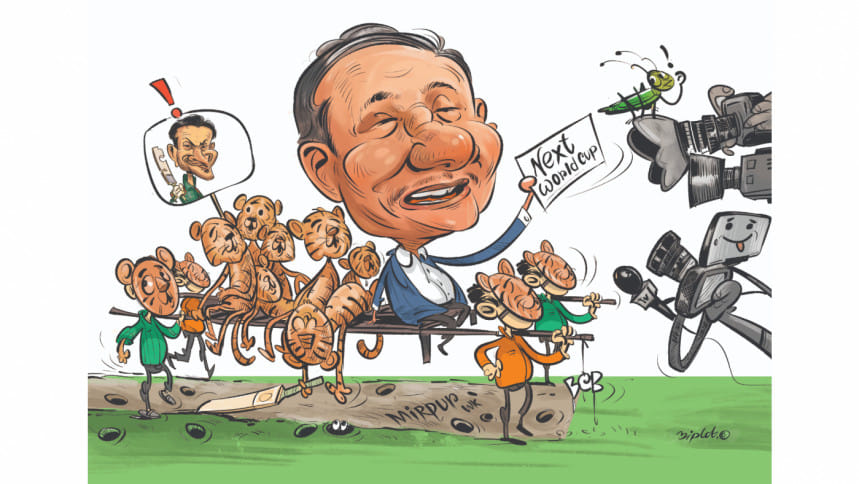BCB’s masterclass in mismanagement

A day after Bangladesh's feeble World Cup campaign ended in an apt whimper, a Supreme Court lawyer on Sunday sent the Bangladesh Cricket Board a legal notice asking its board president, CEO and national captain to step down.
It is a mark of how much the Tigers' performance matters to the general public that such a notice was sent, and to demand stern action after an ignominious show on the global stage seemed to reflect the sentiment of the hour. However, there was one element in the legal notice that did not seem to reflect reality – that the BCB played a "silent role" in the national team's slide.
A glance at BCB's actions this year in the lead-up to the World Cup strongly suggests that, quite apart from playing a silent or passive role, in most matters concerning the national side it has actively engineered the steep slide in what will be remembered as a masterclass in mismanagement. In some other aspects, it stayed silent when it should have acted.
Consider where the team finished in the Super League – a points table where the top eight teams, based on performance in 24 matches played over the previous two years, gain direct qualification to the World Cup. Bangladesh finished third in that league, with only table toppers New Zealand having more wins (16) than Bangladesh's 15.
What no one would have thought, say, after Bangladesh beat Ireland 2-0 away in May this year, was that Bangladesh's tournament would be all but over before November, that they would lose seven out of nine matches including to the Netherlands, and they would not even be competitive in those losses – basically the worst World Cup performance in the country's history, just months after they were poised to put on their best show.
With good performances and a settled team over the past two years, the BCB's role should have been to ensure that a functioning team continues on a promising path, but what did they in fact do?
Whatever one may feel about Russel Domingo's calibre as head coach, the fact is that he took charge of a team at the end of another disappointing World Cup in 2019 and, along with new Test captain Mominul Haque (a first ever Test win in New Zealand), new ODI skipper Tamim Iqbal (a maiden series win in South Africa) and T20I skipper Shakib Al Hasan (a home series win against Afghanistan), delivered some historic wins for Bangladesh.
Domingo resigned at the end of last year, but even before that there were signs that he never quite had the confidence of the board despite seeing Bangladesh through some of its best times. That is not surprising – the board's preference for coaches has often not been linked to the latter's performance or track record. In keeping with that tradition, instead of encouraging a successful coach to stay on till the end of his contract post the 2023 World Cup, they brought back an unsuccessful one.
The board appointed Chandika Hathurusingha on January 31 this year, less than six years after the Sri Lankan left Bangladesh unceremoniously, before expiry of his contract and without public explanation, following a disastrous tour of South Africa in late 2017.
When he departed, Hathurusingha left behind a team short of confidence, divided and with the feeling that the coach had undermined the playing leadership, with then Test skipper Mushfiqur Rahim hinting strongly at this during the tour. Hathurusingha then took up the head coach's role in Sri Lanka, and was sacked by the country's board in 2019 for, among other reasons, creating disharmony in the team.
In his first stint with the Tigers, Hathurusingha butted heads with all of Bangladesh's top cricketers – Shakib, Mushfiqur, Mashrafe Bin Mortaza, Tamim, and Mahmudullah Riyad.
Part of BCB's masterclass in mismanagement was bringing such a character, who had already shown them his true colours and a reputation for sowing disharmony, back to helm a settled team.
Less than a month after Hathurusingha's appointment, BCB boss Papon made sure the Sri Lankan had enough disharmony to work with by publicly stating that there was a rift between then ODI captain Tamim and star all-rounder Shakib. That there had long been tensions between them was an open secret, but the two had managed to keep it out of the cricket Bangladesh played. However, Papon saying it was "harmful for the younger generation of players who look up to them" seemed to suggest that something had to change. In a World Cup year, in a team that was successful and settled.
By his own admission, Tamim is emotional. He should not have made an impulsive retirement announcement in the middle of a series and three months before the World Cup. It obviously harmed the team's preparations and stability.
The BCB tried to talk him out of it, but we do not know what went on behind the scenes – only that Papon had very recently blasted Tamim publicly for saying he was not 100 percent fit. Neither do we know if the board examined the role of the head coach, who should have been creating an atmosphere of harmony that would enable the team and its captain to keep going from strength to strength.
The retirement decision was reversed at the behest of the prime minister, and Tamim chose to step down as captain while continuing as player.
Tamim said his recurring back problems played a role, but was not the only factor. Whatever those unknowns, for a board president who prides himself on being a guardian to the national cricketers, it was a failure.
That failure, however, pales in comparison to what followed. A day before the squad was to depart for the World Cup, Tamim, the team's only quality opener, was dropped. In a social media post, Tamim said he could not take the nasty games being played around the national team. He said he was asked to bat lower down the order in the first match against Afghanistan. This was before the squad was selected or the team management had assessed the conditions first hand.
Tamim also said a board high-up had made the communication about batting lower. This was highly irregular as, according to Mashrafe, Bangladesh's most successful captain, that communication should only have come from the captain, coach or a member of team management.
Then came perhaps the most toxic turn in Bangladesh's path to World Cup disgrace. Shakib Al Hasan's interview with a local TV channel, aired hours after the team's departure, featured the national captain viciously attacking Tamim.
Shakib also said he had nothing to gain from being captain.
From a settled and successful team led by the country's best opener to a fractured, divided one under a reluctant captain – this has been the journey on which the BCB has led the country's cricket and its supporters, who invest both emotion and money into the Tigers.
After the last World Cup, BCB sacked then head coach Steve Rhodes. This time too, they will likely take some action, but after two consecutive World Cup failures and a decade of failing to advance the country's cricket, are Papon and Co in a position to make moves?
Or, as the SC lawyer said in the legal notice, should the high-ups resign and a committee be formed to probe their failures? Papon's board has tried one of those options before, and it has not produced any changes.

 For all latest news, follow The Daily Star's Google News channel.
For all latest news, follow The Daily Star's Google News channel. 









Comments